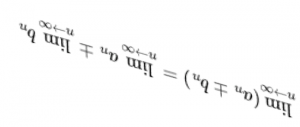 I seem to have a central theme to many of the last posts that is related to the demarcation between science and non-science, and also to the limits of what rationality allows where we care about such limits. This is not purely abstract, though, as we can see in today’s anti-science movements, whether anti-vaccination, flat Earthers, climate change deniers, or intelligent design proponents. Just today, Ars Technica reports on the first of these. The speakers at the event, held in close proximity to a massive measles outbreak, ranged from a “disgraced former gastroenterologist” to an angry rabbi. Efforts to counter them, in the form of a letter from a county supervisor and another rabbi, may have had an impact on the broader community, but probably not the die-hards of the movement.
I seem to have a central theme to many of the last posts that is related to the demarcation between science and non-science, and also to the limits of what rationality allows where we care about such limits. This is not purely abstract, though, as we can see in today’s anti-science movements, whether anti-vaccination, flat Earthers, climate change deniers, or intelligent design proponents. Just today, Ars Technica reports on the first of these. The speakers at the event, held in close proximity to a massive measles outbreak, ranged from a “disgraced former gastroenterologist” to an angry rabbi. Efforts to counter them, in the form of a letter from a county supervisor and another rabbi, may have had an impact on the broader community, but probably not the die-hards of the movement.
Meanwhile, Lee Mcyntire at Boston University suggests what we are missing in these engagements in a great piece in Newsweek. Mcyntire applies the same argument to flat Earthers that I have applied to climate change deniers: what we need to reinforce is the value and, importantly, the limits inherent in scientific reasoning. Insisting, for example, that climate change science is 100% squared away just fuels the micro-circuits in the so-called meta-cognitive strategies regions of the brains of climate change deniers. Instead, Mcyntire recommends science engages the public in thinking about the limits of science, showing how doubt and process lead us to useable conclusions about topics that are suddenly fashionably in dispute.
No one knows if this approach is superior to the alternatives like the letter-writing method by authorities in the vaccination seminar approach, and it certainly seems longer term in that it needs to build against entrenched ideas and opinions, but it at least argues for a new methodology.… Read the rest